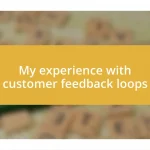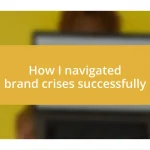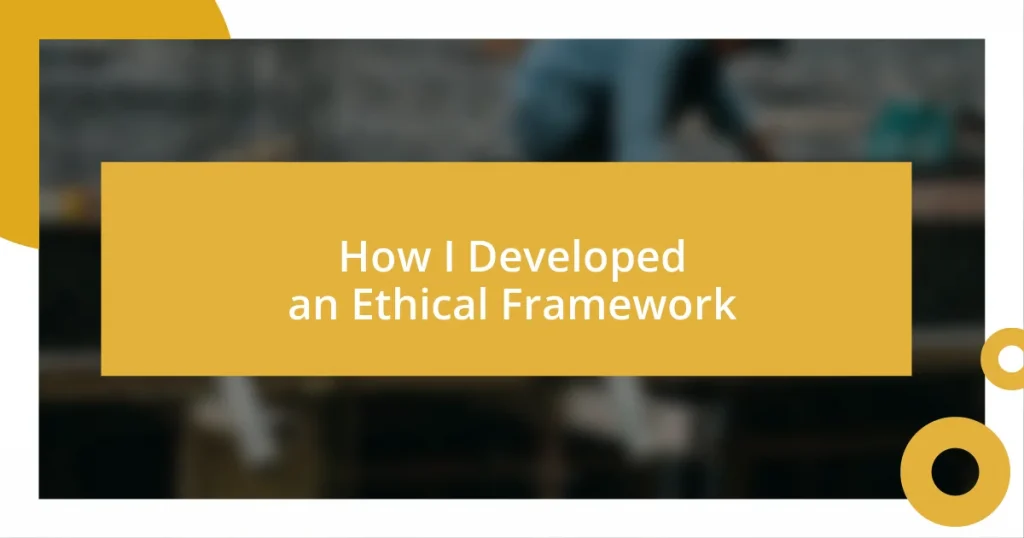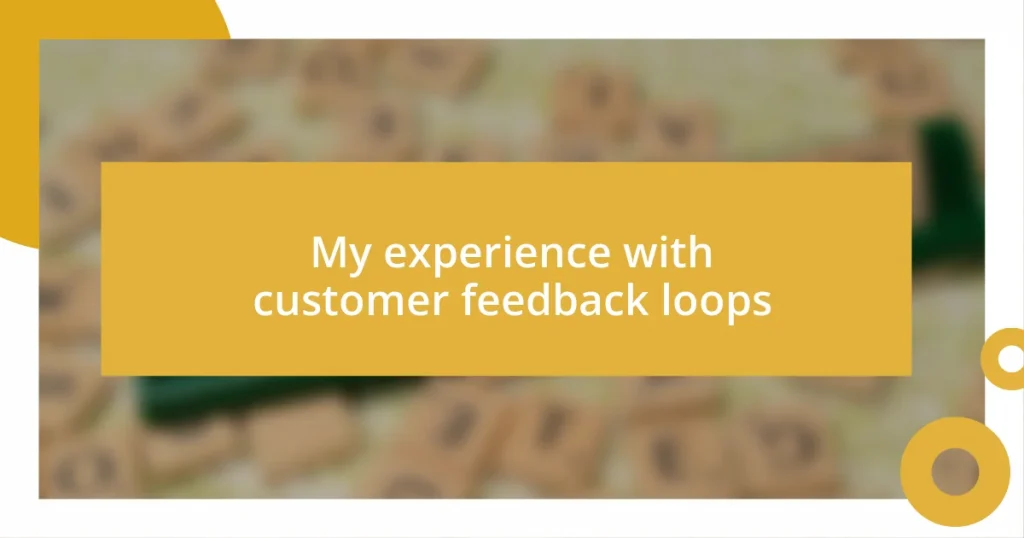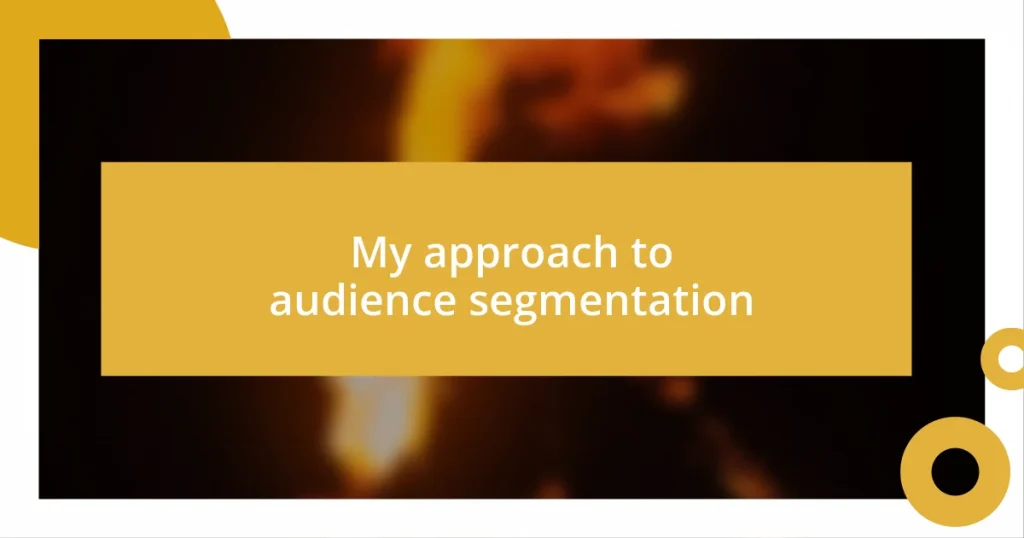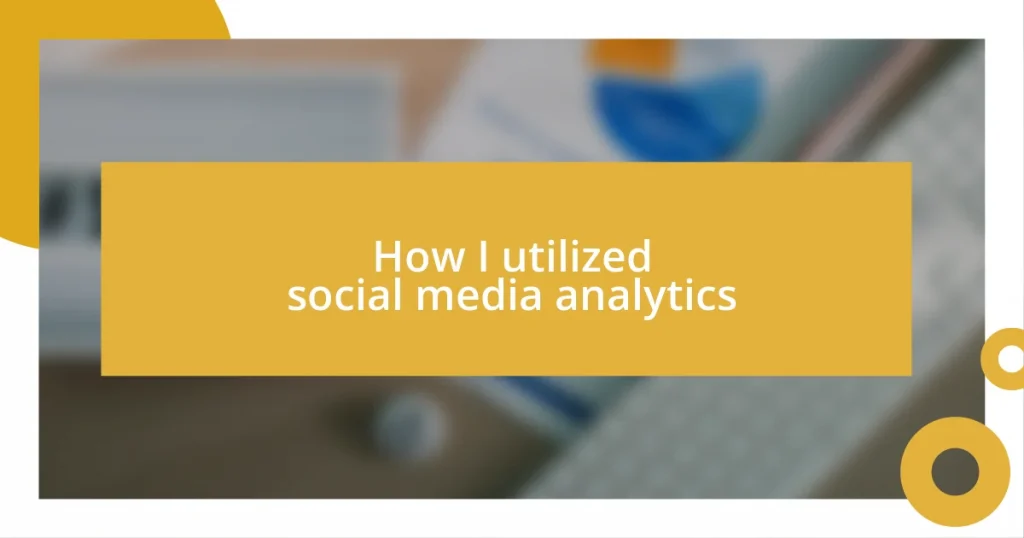Key takeaways:
- Developing an ethical framework involves identifying personal values through introspection and reflection on significant life experiences, which guide decision-making.
- Analyzing ethical dilemmas requires understanding stakeholders, weighing potential consequences, and aligning options with core values to transform complex decisions into manageable steps.
- Testing and reflecting on one’s ethical framework through real-life challenges and feedback promotes personal growth and continuous evolution of ethical insights and principles.
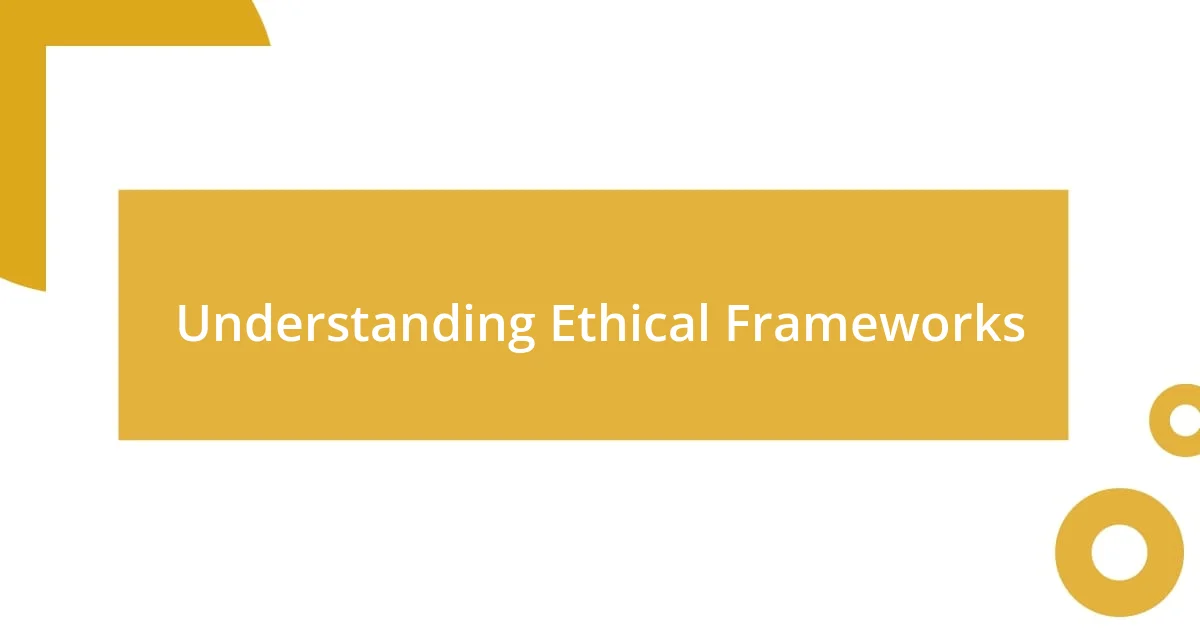
Understanding Ethical Frameworks
An ethical framework serves as a guiding compass in the complex landscape of human interactions, helping us navigate dilemmas by providing structured reasoning. I vividly remember a time in my career when I faced a tough decision, debating between corporate loyalty and fairness to my colleagues. That moment made me realize how vital it is to have a clear ethical guideline; without it, how can we truly determine right from wrong?
Consider the various ethical theories—utilitarianism, deontology, and virtue ethics, for example. Each offers a distinct lens through which to view our actions and their consequences. When I first encountered these theories during my studies, it felt like unlocking secret codes that could help explain human behavior. This exploration not only shaped my understanding but also made me question how I would apply these principles in real-life situations.
In essence, developing an ethical framework means asking ourselves tough questions: What do we value most? How do our choices affect others? Reflecting on these questions has often pushed me out of my comfort zone, prompting genuine introspection and growth. Crafting my own ethical framework became not just an intellectual exercise but a deeply personal journey that aligns my actions with my core beliefs.
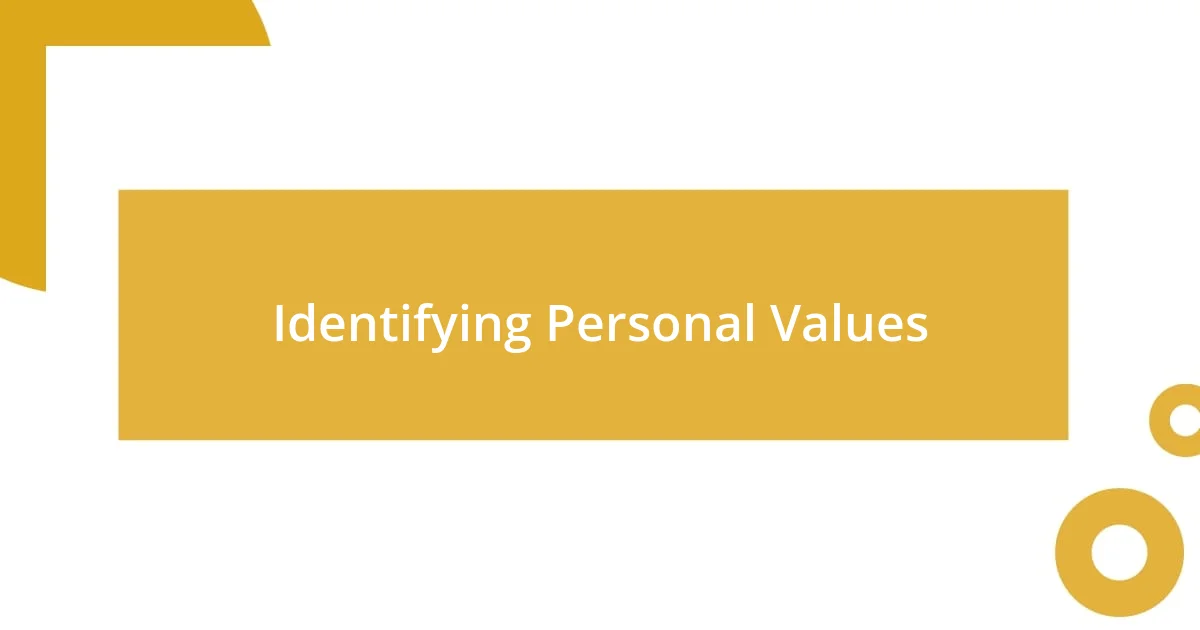
Identifying Personal Values
To identify personal values, I found it essential to dive deep into my own experiences and emotions. I often reflect on pivotal moments—like when a friend took the fall for a mistake I made at work. That taught me the value of integrity. It made me appreciate honesty not just as a principle but as a cornerstone of every relationship I cherish. By examining these experiences, I pinpointed values that resonate with me on a fundamental level.
Here are some key personal values I’ve identified over time:
- Integrity: Upholding honesty even when it’s uncomfortable.
- Empathy: Understanding and sharing the feelings of others.
- Responsibility: Owning my actions and their impacts on others.
- Growth: A commitment to lifelong learning and self-improvement.
- Respect: Valuing others’ perspectives and differences.
Thinking back, every time I aligned my actions with these values, I felt a wave of fulfillment. Recognizing what truly matters to me has not only clarified my decision-making process but also reinforced a sense of purpose in my life.
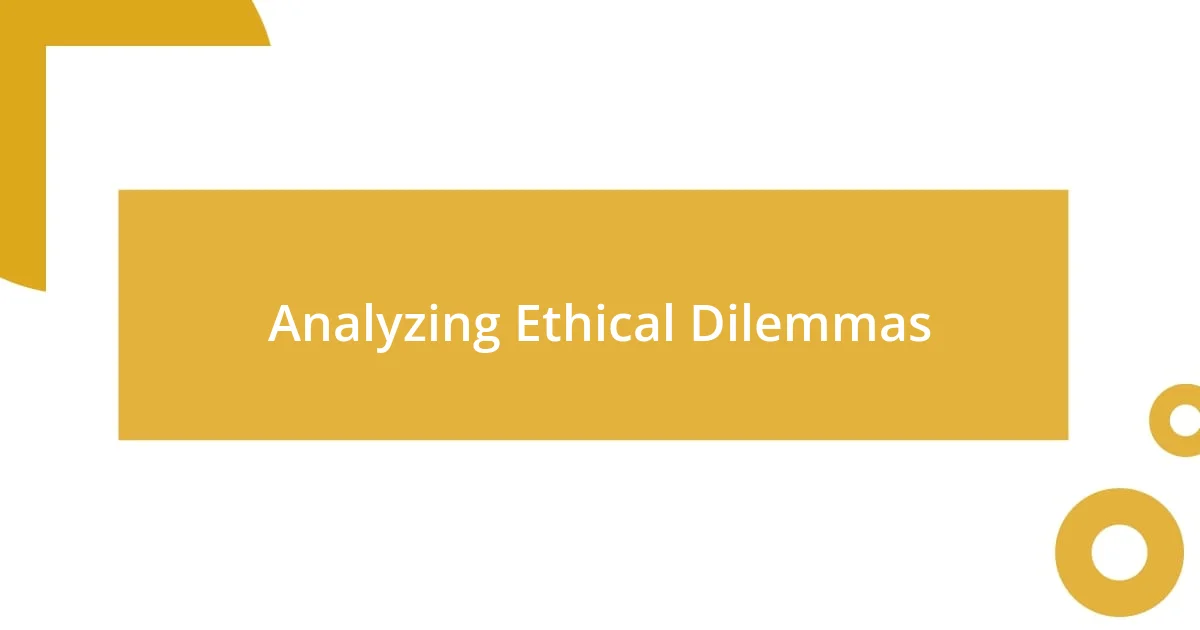
Analyzing Ethical Dilemmas
Analyzing ethical dilemmas can often feel like navigating a minefield of emotions and consequences. I recall a challenging project at work that involved budget cuts, forcing me to consider whether to let go of a loyal employee or compromise the project’s success. This choice weighed heavily on me, as it not only affected the individual but also strained the morale of the team. Understanding the different aspects of the dilemma—such as financial responsibility versus personal loyalty—was essential for reaching a decision that aligned with my ethical framework.
To analyze ethical dilemmas effectively, I often ask myself: What are the potential outcomes of each option? When I faced a situation where a client pressured me to compromise on quality for faster delivery, I realized that my decision would set a precedent. Weighing the short-term gains against long-term credibility was crucial. I learned that engaging with the emotional implications of these choices reveals deeper insights into what truly matters, not just for me but for all parties involved.
In my experience, breaking down ethical dilemmas into key components helps clarify the path forward. I find it beneficial to outline the stakeholders, potential consequences, and my core values. This systematic approach transforms the overwhelming nature of dilemmas into manageable decisions. After making my choices, I reflect on their outcomes, allowing me to learn and refine my ethical framework continuously. Each dilemma becomes an opportunity for growth rather than a deterrent.
| Aspect | Description |
|---|---|
| Stakeholders | Identify who is affected by the decision. |
| Consequences | Assess potential outcomes for each option. |
| Core Values | Align options with personal and ethical values. |
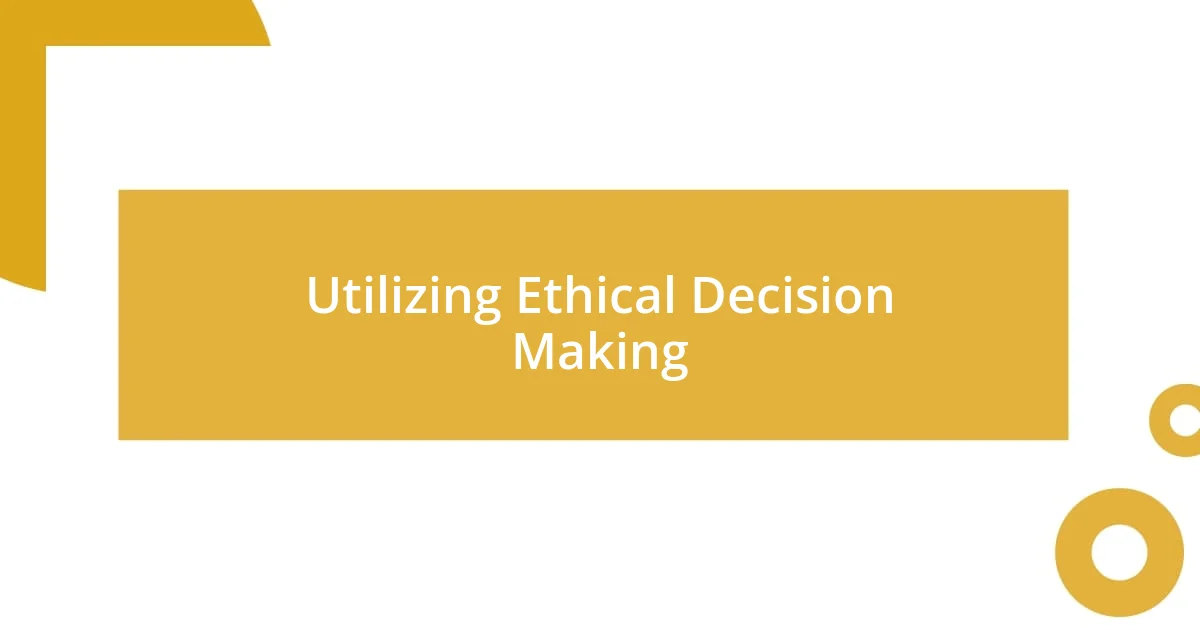
Utilizing Ethical Decision Making
Utilizing ethical decision-making has been a transformative aspect of my personal and professional growth. I remember a time when I was faced with a significant conflict between my job responsibilities and my commitment to a close friend. I had to decide whether to report a mistake that jeopardized a project, knowing it could deeply affect my friend’s career. That moment prompted me to reflect deeply on my values—what did I truly stand for? The process of weighing those competing interests brought clarity to my principles and helped me align my decision with my ethical framework.
In practicing ethical decision-making, I often find myself asking questions that challenge my perceptions: Who will truly benefit from my decision? When confronted with choices that seem equally valid, I pause to consider the larger implications. I recall deciding between two candidates for promotion; one had a better track record, but the other embodied my value of mentorship and growth. Engaging with these questions not only highlights my biases but also holds me accountable to my ethical standards. I learned that ethical decision-making isn’t just about choice—it’s a vow to reflect the values I hold dear in every action I take.
There’s a certain weight that comes with making ethical decisions, but I’ve found that embracing that weight leads to personal growth. It’s like carrying a backpack—each decision adds a layer, but those layers are made up of the integrity and responsibility I’ve chosen to embody. Reflecting on how those choices align with my core values helps me navigate future dilemmas. Each decision I face becomes a stepping stone toward becoming a more ethically aligned version of myself, and I invite you to consider: How do your choices shape who you are becoming?
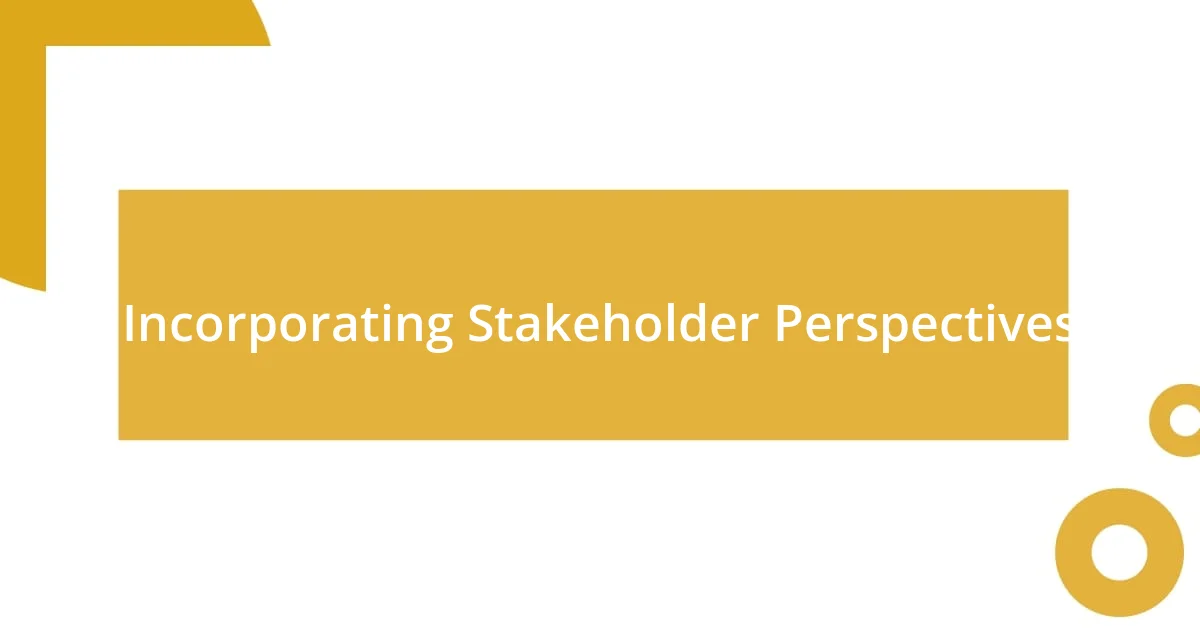
Incorporating Stakeholder Perspectives
Incorporating stakeholder perspectives has been vital in shaping my ethical framework. I remember working on a project that significantly impacted the local community. Before making decisions, I gathered input from various stakeholders—community members, team members, and even external partners. This process opened my eyes to the diverse concerns that surfaced, which I would have otherwise overlooked. It was a poignant reminder that every decision echoes beyond just immediate results.
I’ve often found that engaging with stakeholders invites a level of honesty that can be uncomfortable yet fruitful. In one instance, I facilitated a discussion with my team about a potential product change. During this dialogue, I was surprised to hear how invested everyone was in maintaining our original values. That experience taught me that listening is just as crucial as speaking; it fosters trust and collaboration. How can we truly move forward if we don’t consider the voices of those who will be touched by our decisions?
By including diverse viewpoints, I develop a richer understanding of ethical implications. For example, when participating in a charity initiative, I reached out to beneficiaries of our support to ask what they needed most. Their insights reshaped our approach, focusing not just on donations but on sustainable practices that empowered them. Moments like this remind me how powerful it is to involve stakeholders; it turns decision-making into a shared journey instead of a solitary path. In what ways can you cultivate stakeholder input in your own ethical considerations?
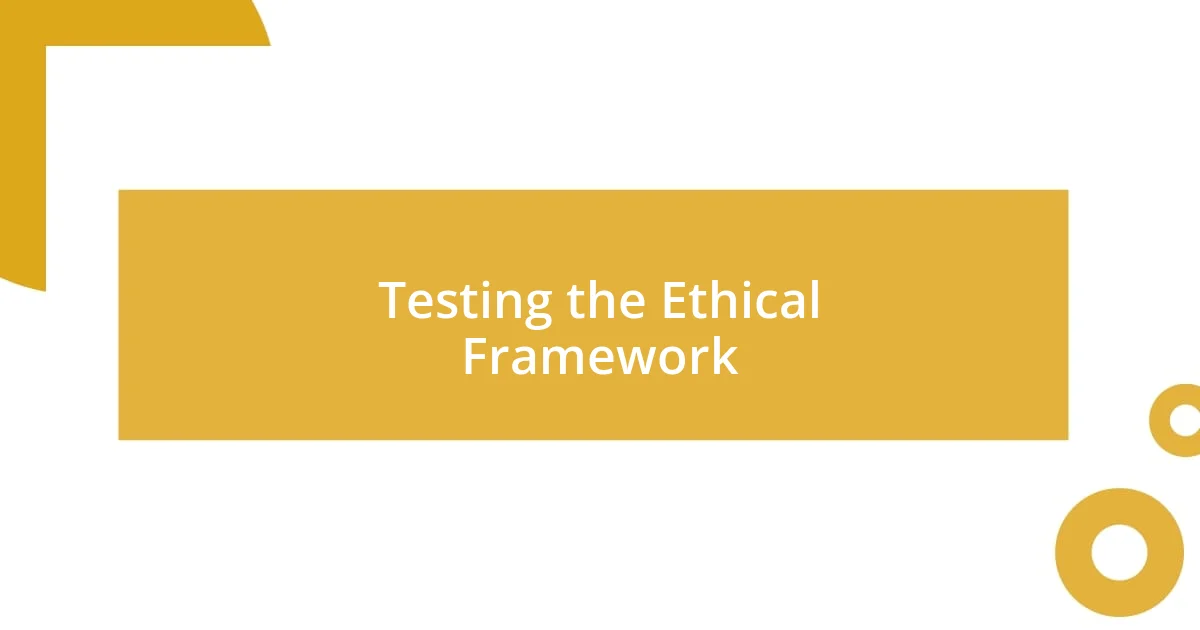
Testing the Ethical Framework
Testing my ethical framework has been a revealing process, often characterized by real-life challenges that forced me to scrutinize my beliefs in action. I think back to a critical moment when I had to decide whether to support a controversial initiative at work. The decision wasn’t straightforward—how did I weigh my personal convictions against my professional obligations? This tension pushed me to examine my values, revealing gaps in my framework that needed addressing.
I’ve learned that the best way to test an ethical framework is to place it in scenarios that really matter. For instance, during a team meeting, I faced a situation where a colleague’s actions could lead to potential ethical breaches. I felt my heart race as I considered speaking up, fearing repercussions and potential conflict. It dawned on me that this experience was a litmus test for my commitment to my principles. I opted to address it head-on, realizing that standing firm in my ethics would strengthen not only my framework but also the culture within my team.
A vital lesson I took from these experiences is the importance of feedback. After a major project wrapped up, I solicited opinions from peers about how ethical decisions were made along the way. What surprised me was that many felt decisions were rushed and lacked transparency. This feedback made me reconsider my framework’s effectiveness in real-world situations. How often do we seek out this kind of honest reflection? By fostering an environment that welcomes critique, I can refine my ethical framework continuously, ensuring it evolves with my experiences and the complexities of my surroundings.
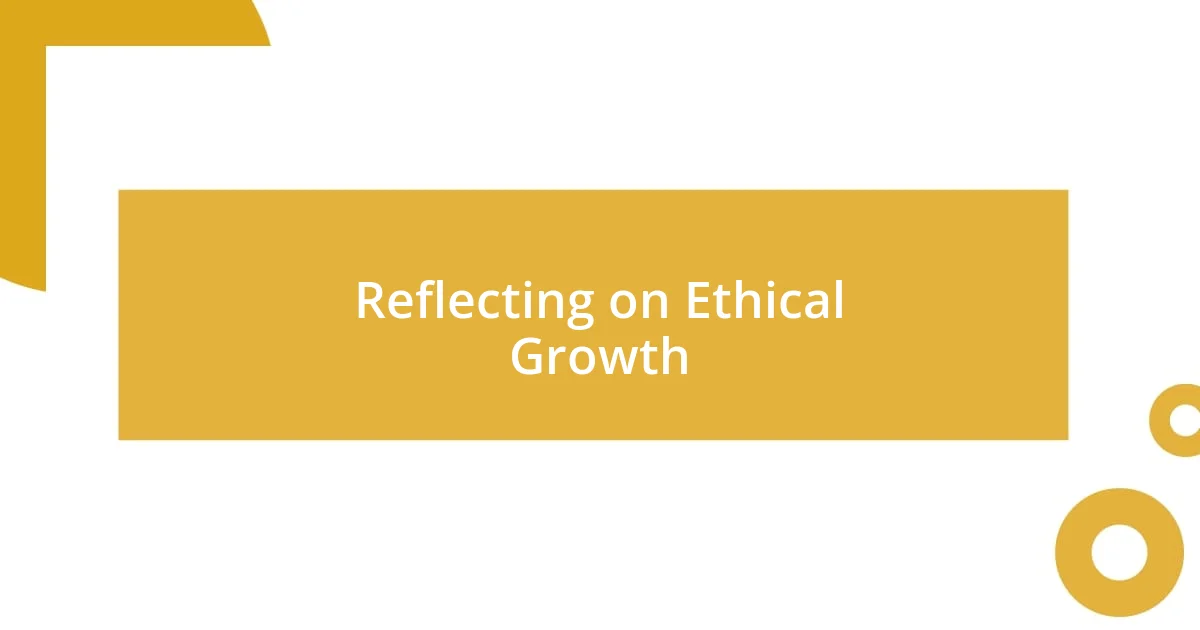
Reflecting on Ethical Growth
Reflecting on my ethical growth has often felt like peeling back layers of an onion, each layer revealing deeper insights. I recall a specific instance when a mentor encouraged me to think about a tough ethical dilemma I faced early in my career. It led me to question not only my choices but also the motivations behind them. I realized that ethical growth isn’t always about making the “right” decision; it’s about understanding the “why” behind those decisions and how our values evolve over time.
One painful lesson in this journey came when I faced backlash for a decision I made without fully considering its implications. I felt a wave of anxiety wash over me as I read criticism from my peers. In that moment, I learned that facing the consequences of my actions forces me to reevaluate and refine my ethical stance. Why is it that only through discomfort do we often find the most significant opportunities for growth? Perhaps it’s because being challenged sharpens our ethical instincts, driving us to reflect deeply on what truly matters.
As I look back on my experiences, I see that ethical growth is an ongoing dialogue, both with myself and others. I often engage in conversations about ethics with friends, and their perspectives sometimes leave me astonished. They challenge my thinking in ways I hadn’t anticipated—reminding me that our ethical frameworks are never fully complete. How open am I to being influenced by those around me? Embracing this constant evolution enriches my understanding, making my ethical framework not just a guideline but a living entity that breathes with my experiences.
